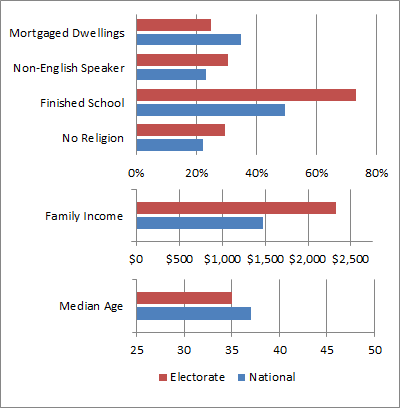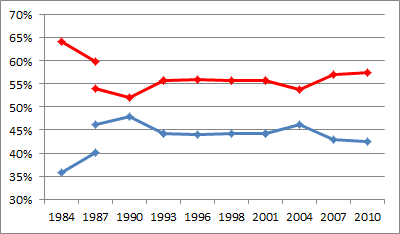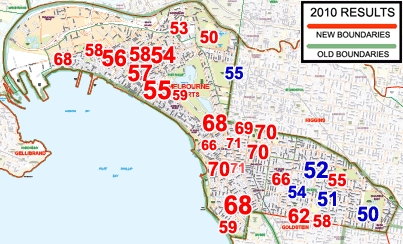NOTE: Poll Bludger will be closed for comments for two weeks from December 25 to January 7 inclusive.
Melbourne Ports covers Bayside inner Melbourne from the mouth of the Yarra through Port Melbourne and Albert Park to St Kilda, further jutting inland in the south to take in Elsternwick. The redistribution to take effect at the next election will transfer 9000 voters in Elsternick and Caulfield South south of Glen Huntly Road to Goldstein, increasing the Labor margin from 7.6% to 7.9%. Melbourne Ports has the largest Jewish community of any electorate in Australia, accounting for 12.8% of the local population, and ranks at or near the top for numbers of Poles, Russians and Hungarians. It also has the second lowest proportion of Christians after its northern neighbour, Melbourne.
Labor’s greatest source of strength in the electorate is around St Kilda, where booths results in 2010 typically had Labor in the high thirties, the Greens on or around 30%, and the Liberals in third place in the mid-twenties. At the city end of the electorate, encompassing Port Melbourne, South Melbourne and Albert Park, green-left inner-city tendencies are counterbalanced by wealthy Liberal-voting elements. The strongest areas for the Liberals are in the east of the electorate, both around South Yarra in the north and Caulfield in the south, where the suburbs begin to take on the character of the electorate’s safe Liberal neighbour, Higgins.
Melbourne Ports was once noted for its preponderance of waterfront workers and generally working class voter base, and was accordingly very safe for Labor for most of its history. It has since transformed into the tenth wealthiest electorate in the country, a process which has considerably worn down Labor’s margin. The seat has nonetheless been extremely stable over the past two decades, recording essentially no swing at all at the consecutive elections of 1996, 1998 and 2001, a 2.0% swing to the Liberals in 2004, and swings to Labor of 3.4% in 2007 and 0.4% in 2010. The 2004 election proved Labor’s low water mark to date, the margin falling to 3.7%.
Labor has held the seat without interruption since 1906, with only five members serving over that time: James Matthews until 1931; Ted Holloway, a Curtin-Chifley government minister who moved to Melbourne Ports after unseating Prime Minister Stanley Bruce in Flinders two years earlier, until 1951; Frank Crean, Whitlam government Treasurer and father of Simon, until 1977; Clyde Holding, who came to the seat after a long and unproductive spell as state Opposition Leader, until 1998; and the incumbent, Michael Danby.
A member of the Right sub-faction associated with Stephen Conroy and Bill Shorten, Michael Danby’s pre-parliamentary career included stints as editor of the Australia-Israel Review, staffer to Hawke government minister Barry Cohen and industrial officer for the Shop Distributive and Allied Employees Association. He is frequently in the news as a supportive voice for Israel, most recently after the Prime Minister was prevailed upon to have Australia support observer status for the Palestinian territories at the United Nations. Although occasionally mentioned as a candidate for promotion, he is yet to achieve a position more senior than Opposition Whip, which he held between 2001 and 2007.
The preselected Liberal candidate for the second electorate running is Kevin Ekendahl, a manager at non-profit social enterprises organisation Try Australia.










Crikey is committed to hosting lively discussions. Help us keep the conversation useful, interesting and welcoming. We aim to publish comments quickly in the interest of promoting robust conversation, but we’re a small team and we deploy filters to protect against legal risk. Occasionally your comment may be held up while we review, but we’re working as fast as we can to keep the conversation rolling.
The Crikey comment section is members-only content. Please subscribe to leave a comment.
The Crikey comment section is members-only content. Please login to leave a comment.